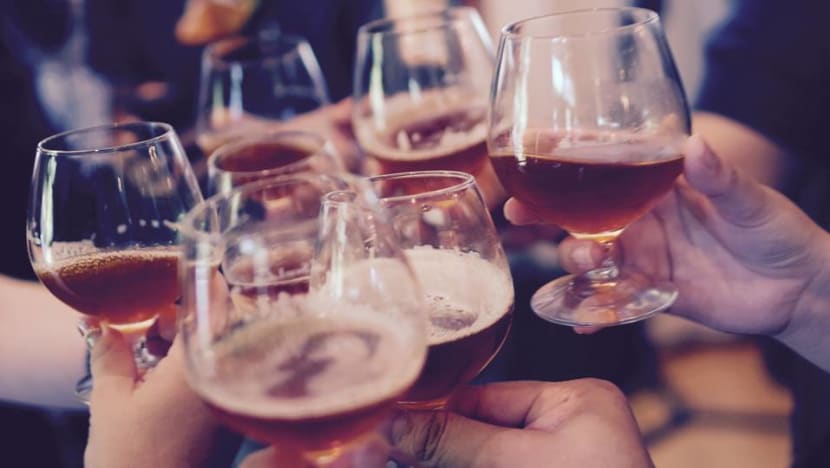commentary Commentary
Commentary: When pleasure turns into habit and abuse – Singapore’s growing binge drinking problem
Addictions start as pleasure-seeking experiences, before they become habit, then abuse, says Dr Prem Kumar Shanmugam.

(Photo: Unsplash/Alfonso Scarpa)
SINGAPORE: “It began when I started drinking socially with my friends. They would order towers of beers while watching football. It was fun and harmless.”
“But when I started to work, I grew dependent on alcohol. It was my form of escape as work became more demanding and tiring."
“The thought of a stiff drink at the end of the day kept me going through the work pressures – though it was never just a single drink. I would feel anxious if I did not get my dose of alcohol in the evenings.”
Does this story sound familiar? Even as alcohol consumption remains legal, alcoholism is a real problem.
A BLURRED LINE BETWEEN SOCIAL DRINKING AND ALCOHOLISM
Singapore has one of the lowest alcohol consumption rates in Asia, according to the World Health Organisation, but the number of binge drinkers has been on the rise.
Youths aged 18 to 34 were twice as likely to drink excessively and binge drink, according to an Institute for Mental Health 2010 study.
READ: Commentary: The dark underbelly of binge drinking among youths
Part of this arises because social drinking has become an acceptable norm, so binge drinking and alcohol abuse go unnoticed and are deemed normal behaviour.
Drinking is a widely popular activity that is socially and cultural accepted. How then does a person transition from enjoying an alcoholic drink to becoming an alcoholic?

Job stress, peer pressure, family background, and even genetic factors play a part in a person getting addicted.
It’s easy to tell someone to quit or “fight” their addictions. But people struggling with addictions cannot control their actions or make rational decisions about their behaviour, even while consciously facing up to their negative consequences.
For an alcoholic, after a long period of drinking, his or her brain begins to rely on alcohol to produce certain chemicals. This is what makes it difficult for heavy drinkers to quit and can cause uncomfortable withdrawal symptoms.
UNDERSTANDING THE ADDICTIONS
Addiction is a chronic, relapsing disease affecting the brain’s reward and motivation systems.
It is a global phenomenon; one that affects people regardless of socio-economic status, race or religion. Addiction has an impact on more than the abuser – affecting their family, friends, the healthcare system and wider society.
The reality is that no two addictions are the same. To successfully address and treat an addiction – whether to alcohol, drugs or smoking – perhaps we ought to first understand the factors that fuel it.
READ: Commentary: Did you look forward to that glass of wine a bit too much?
Addictive substances get people hooked because they initially provide a sense of relaxation allowing the user to feel “rewarded”. People consume such substances believing they will not get addicted; that they will be able to manage how much they consume.
Little do they know that their bodies organically builds a tolerance for the substance, requiring more of it until the use turns into a need.

Unfortunately, some people are predisposed to becoming dependent on certain substances due to their biological and psychological background.
Do you know people who only smoke when they enjoy an alcoholic beverage? Or gamblers who use certain type of drugs to stay alert? There is a tendency for addictions to co-exist.
READ: Commentary: The myth about 'beer before wine'
Very often addictions come with another problem – a phenomenon known as comorbid disorders or dual diagnosis. This happens when an abuser or substance dependent person not only suffers from an addiction, but also from a mental health disorder.
Bipolar disorder, depression or schizophrenia are common diagnoses that result from or lead to substance dependency. In fact, a nationwide epidemiological study funded by the Ministry of Health and Temasek Foundation Innovates showed a rise in the prevalence of people having two or more mental disorders, including alcohol addiction, at the same time.
BEYOND A COOKIE-CUTTER APPROACH
We need to look beyond a one-size-fits-all approach to help individuals fight their addictions. A comprehensive treatment programme would be customised to individuals.
Addictions take time to form, so they also take time to overcome. Treatment needs to be flexible and long-term.
When treating alcoholism, the approach would generally be the abstinence model – especially if the person is diagnosed as an alcoholic or a binge drinker.

However, alcoholism is a chronic relapsing disorder, meaning that those afflicted compulsively seek alcohol despite possibly knowing about its harmful effects.
Once an alcoholic drinks, the reward system of his or her brain is activated, and a vicious cycle kicks into play – the person generally loses control and the drink takes over.
Though there are claims about reduced drinking, more research has to be done before we can safely say we found a credible alternative for abstinence.
READ: Commentary: The hidden costs of a hangover
We need to address addiction through treatment – not punishment in the form of fines, jails, bans or forced rehab.
A tailored, humane and person-centred treatment is our best bet in helping people quit.
DRINKING THIS HOLIDAY SEASON?
With many social events happening around this holiday season, it is especially the time of the year to be more mindful of our alcohol consumption.
As people become health-conscious, it may also be the case that there will be more demand for non-alcoholic cocktails, as more people are choosing to party with alcohol-free drinks.
Yet, if you must, keep in mind that just one occasional glass of wine is good for you – not more.
Dr Prem Kumar Shanmugam, is the CEO and clinical director of Solace Asia Treatment Retreat.














